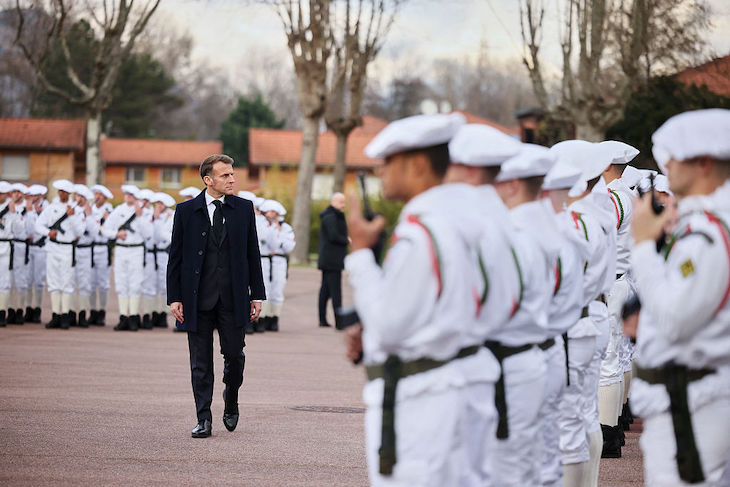National service is being brought back in France. Emmanuel Macron used a visit to a military base in the Alps on Thursday to outline his initiative. The service will begin next year for a term of ten months, and it will be voluntary. Macron’s plan is being viewed as a response to the Russian threat, but for many French people there is a greater – and far closer – menace than president Putin.
This view is shared among the silent majority and explains why Le Pen’s party now has the most seats in parliament
Macron set a target of 50,000 annual recruits by 2035 with most aged 18 and 19, although it will be open for men and women up to 25 who have specific skills. France scrapped military conscription in 1996 but this new variation has the broad support of the public. A poll on Thursday revealed that 83 per cent of people back voluntary military service.
Macron made no mention of Russia in his address. He described an ‘uncertain world’ and said he was counting on the volunteers to ‘spread the spirit of defence, and harden the nation’s spirit of resistance’.
Nonetheless, Putin is never far from the mind of the French elite. Fabien Mandon, the chief of the defence staff, warned last week that France would likely be at war with Russia in the next ‘three to four years’ and must prepare to ‘lose its children’.
His remarks drew an angry response from Jean-Luc Melenchon, the leader of the far-left, as well as Marine Le Pen’s National Rally. Her vice-president, Sebastien Chenu, accused General Mandon of making ‘alarmist statements’.
Others pointed out that France has been losing its children for years: to Islamic extremists, drug cartels and murdering rapists. One of the country’s most experienced retired generals, Emmanuel de Richoufftz, said on television this week: ‘It’s good to rearm for external threats but the rear has to hold. What I see every day are bursts from Kalashnikovs in the inner cities, Frenchmen and women stabbed to death, It seems to me that before rearming for threats beyond our borders we should secure the home front.’
Earlier this month, in Marseille, a 20-year-old man was shot dead in broad daylight. Unfortunately there is nothing unusual about that. Scores of people have been murdered in the city’s drugs wars in recent years. This killing was different, however, because the victim, Mehdi Kessaci, had no links to the cartels. He was targeted apparently as a warning to his brother, Amine, a prominent local politician and anti-drugs campaigner.
Macron called the murder a ‘turning point’ and promised to visit Marseille in December in order to underline his determination to defeat the cartels. He made a similar pledge in 2021 and again last year on a trip to the Mediterranean port. Yet the power, violence and influence of the cartels keeps growing.
The principal one is known as DZ Mafia, the ‘DZ’ comes from Djazaïr, the Arabic word for Algeria. Many of its members, from the bosses down to the street dealers, are of Algerian origin.
Marseille public prosecutor, Nicolas Bessone, recently referred to the cartels as ‘a kind of counter-society’. It isn’t the only one. France has allowed a parallel Islamic society to take root. The Establishment was warned in 2002, when the historian Georges Bensoussan published his book, The Lost Territories of the Republic. But they turned a blind eye to the proselytisation of the Muslim Brotherhood.
The consequences of their cowardice were laid bare last week when a poll revealed the extent of the separation underway in France. Fifty-seven per cent of Muslims aged 15 to 24 prefer Islamic law to Republican law in certain matters, and 42 per cent expressed sympathy for at least one Islamist movement.
There are, of course, many French Muslims who love their country – like Mehdi Kessaci, who was soon to join the police, or Imad Ibn Ziaten, the French paratrooper who was murdered by an Islamist in 2012. ‘You kill my brothers, I kill you,’ said the killer as he fired the fatal shots.
The threat of some form of civil war in France has been a serious topic of discussion since 2021. In that year former and serving military personnel wrote letters to the president warning of the threat from ‘the abandoned banlieues…where France means nothing but an object of sarcasm, contempt or even hatred.’
This view is shared among the silent majority and explains why Le Pen’s party now has the most seats in parliament. Its youthful president, Jordan Bardella, is the favourite to win the 2027 presidential election; a poll this week had him defeating all-comers in a second round run-off.
How might the notoriously violent extreme left respond to a Bardella victory, and his promise to crackdown on immigration? What would the drug cartels and the Islamists do if he went after them? As the riots of 2023 demonstrated, the parallel societies in France are not afraid to flex their muscles when they have a grievance. Macron himself warned last year that if the National Rally came to power it may precipitate a ‘civil war’.
Macron stressed that those teenagers who sign up for national service will not be posted to foreign lands. ‘National service means national territory because it means mobilising to defend ourselves,’ said the president.
France does need defending. Not from Russian troops, who are unlikely to appear at the border any time soon, but from their enemies within.








Comments